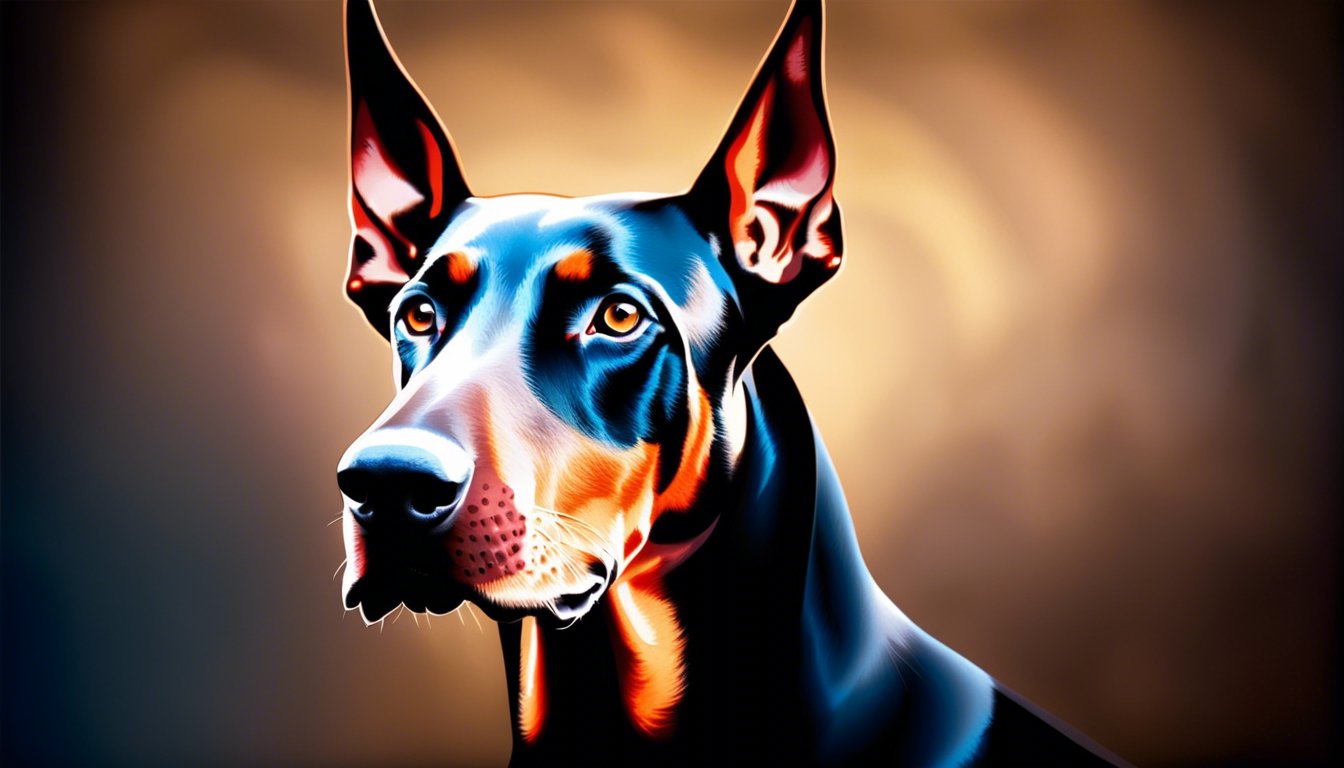The Doberman Pinscher, commonly known as the Doberman, captures attention with its strength, intelligence, and unwavering loyalty. Originating in Germany in the late 19th century, this remarkable breed evolved under the selective breeding efforts of Karl Friedrich Louis Dobermann, a tax collector seeking a reliable companion during his duties.
In this comprehensive guide, we delve into the factual aspects of the Doberman Pinscher breed. We explore its historical origins, distinctive physical traits, and temperament to provide valuable insights for both seasoned enthusiasts and prospective owners alike.
By the end of this article, you’ll gain a deeper understanding of what makes the Doberman Pinscher truly special, empowering you to provide the care and companionship this breed deserves. So, join us as we explore the captivating world of the Doberman Pinscher together.
History and Origin
The Doberman Pinscher breed boasts a rich and intriguing history that traces back to its origins in Germany during the late 19th century. This breed’s story begins with Karl Friedrich Louis Dobermann, a tax collector from Apolda, who had a vision of creating a versatile and protective dog to accompany him during his taxing duties. Dobermann’s profession exposed him to various risks, and he sought a loyal and capable guardian to ensure his safety.
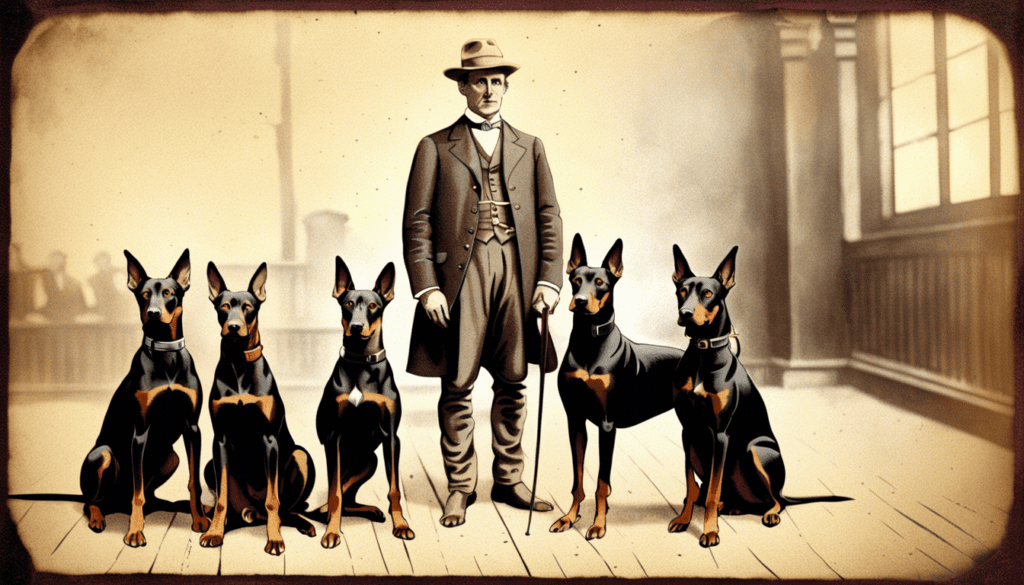
Through a careful and systematic breeding program, Dobermann selectively crossed several dog breeds, including the German Pinscher, Rottweiler, Greyhound, and Weimaraner, to develop what would become known as the Doberman Pinscher. This intentional blending of traits aimed to create a dog that possessed not only strength and agility but also intelligence and unwavering loyalty.
Over time, the breed’s characteristics continued to evolve as breeders refined the Doberman’s temperament and physical attributes to better suit its roles as a guard dog, police dog, and companion. The Doberman Pinscher quickly gained recognition for its versatility, excelling in various tasks ranging from protecting property to serving in the military and law enforcement.
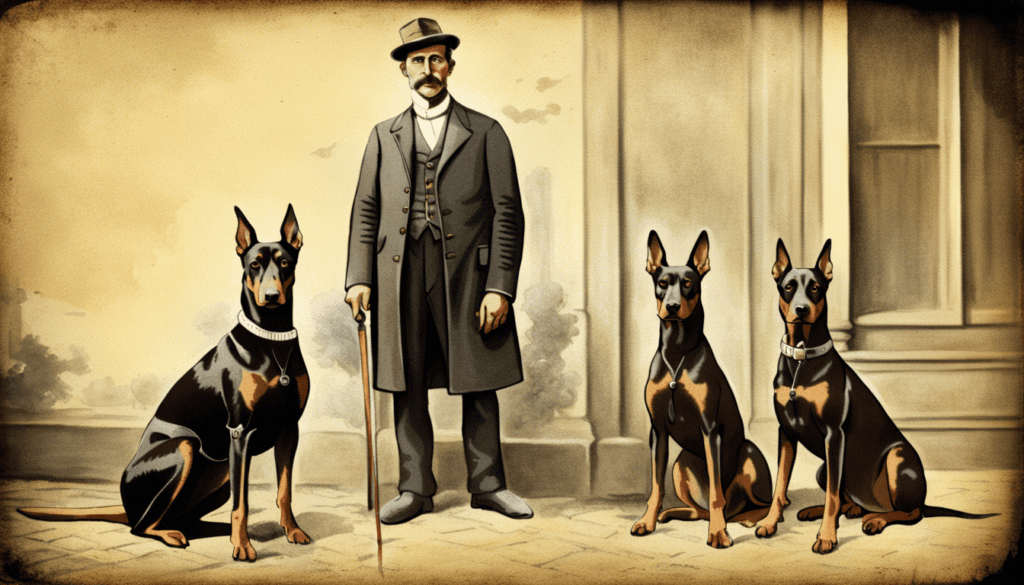
Today, the Doberman Pinscher remains a popular and highly esteemed breed worldwide, cherished for its remarkable combination of intelligence, loyalty, and courage. Its journey from a humble beginning as a tax collector’s companion to its current status as a beloved family pet and working dog exemplifies the breed’s enduring legacy and adaptability.
Physical Characteristics
The Doberman’s appearance is universally striking, blending power and elegance in a commanding presence. With its sleek, muscular physique and poised stance, the Doberman exudes confidence and athleticism in every movement.
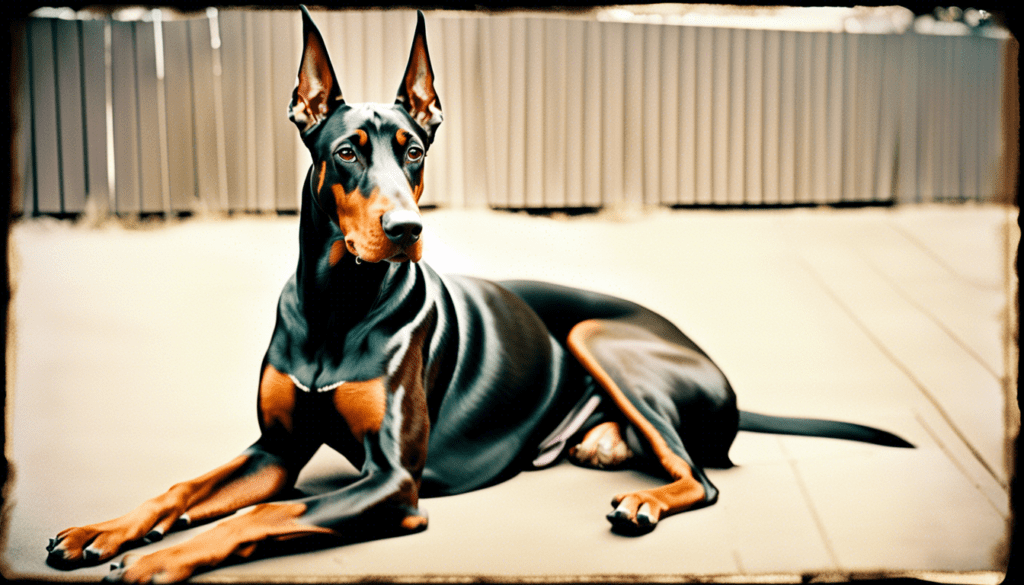
Standing proudly between 61 to 71 centimeters (24 to 28 inches) at the shoulder, the Doberman is a sight to behold, with males typically displaying a more robust build compared to their female counterparts. Their weight ranges from 27 to 45 kilograms (60 to 100 pounds), reflecting their substantial yet agile frame.
The Doberman’s coat comes in various colors, including classic black, rich red, striking blue, and captivating fawn. Each hue highlights the breed’s distinct features, enhancing its regal appearance. Their coat is short, smooth, and lies close to the body, requiring minimal grooming to maintain its sleek appearance.
Distinctive markings further contribute to the Doberman’s allure, with rust-colored patches adorning their muzzle, chest, legs, and eyebrows. These markings, coupled with their glossy coat, add depth and character to the breed’s already captivating appearance, making them a true standout among canines.
Temperament and Personality
The Doberman Pinscher is celebrated for its multifaceted temperament, characterized by a combination of intelligence, alertness, and unwavering loyalty. These dogs are not only fiercely devoted to their families but also possess a natural instinct to protect them, making them excellent guardians.
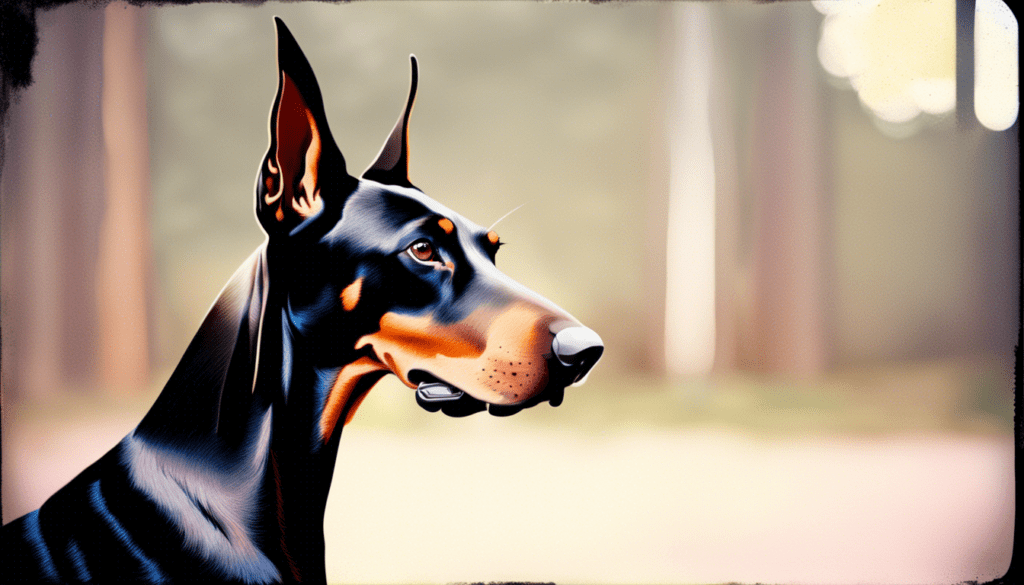
One of the most striking aspects of the Doberman’s personality is its loyalty. These dogs form deep bonds with their human companions and are known to be intensely devoted to their families. They often exhibit a strong sense of protectiveness, willing to defend their loved ones against any perceived threats.
Despite their imposing appearance, Dobermans are typically gentle and affectionate with their family members, including children. They have a remarkably patient and tolerant nature, often displaying an innate understanding of how to interact safely with younger members of the household. With proper socialization and training from an early age, Dobermans can become beloved family pets who thrive on companionship and affection.
In addition to their loyalty and affection, Dobermans are highly intelligent dogs. They possess keen problem-solving abilities and a remarkable capacity for learning. This intelligence, coupled with their eagerness to please, makes them highly trainable. Dobermans excel in obedience training, agility competitions, and various canine sports, where they can showcase their agility, speed, and versatility.
Exercise and Training
Proper exercise and training are essential aspects of caring for a Doberman Pinscher, ensuring they maintain both physical health and mental well-being. This breed thrives on regular activity and mental stimulation, making it important to provide ample opportunities for exercise and training.
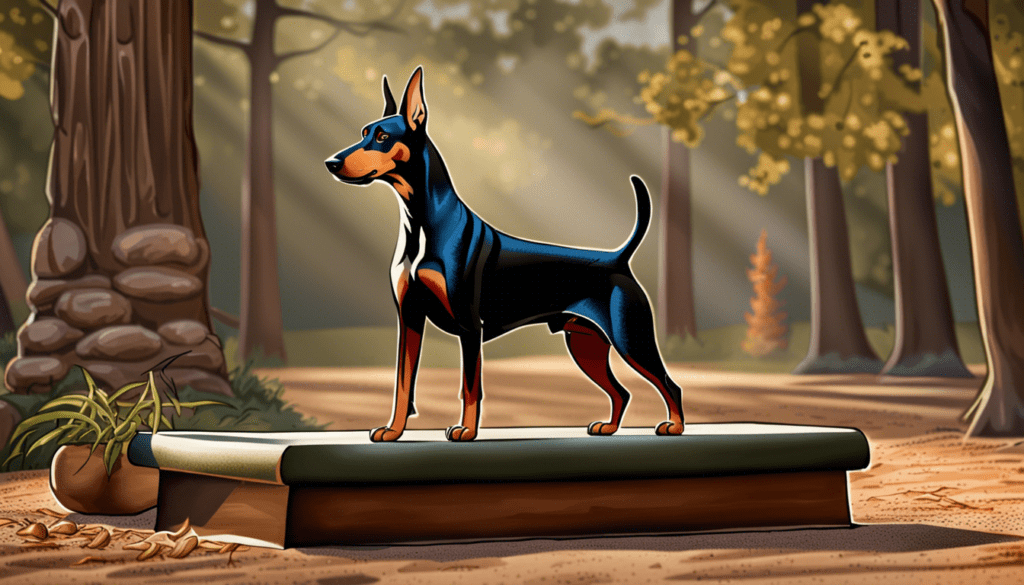
Exercise Requirements for a Doberman Pinscher
Dobermans are energetic dogs that require daily exercise to keep them healthy and happy. Aim for at least 60 to 90 minutes of physical activity each day, which can include brisk walks, jogging, or play sessions in a secure area. Engaging in activities like fetch or agility training can help satisfy their need for physical stimulation while also strengthening the bond between you and your dog.
Regular exercise is not only vital for maintaining their muscular physique but also helps prevent boredom and destructive behaviors that may arise from pent-up energy. Providing structured exercise routines can also promote cardiovascular health and joint mobility, ensuring your Doberman remains active and agile throughout their life.
Importance of Mental Stimulation
In addition to physical exercise, mental stimulation is equally crucial for Doberman Pinschers. These intelligent dogs thrive on mental challenges and require opportunities to engage their minds. Interactive toys, puzzle feeders, and obedience training sessions are excellent ways to provide mental stimulation for your Doberman.
Engaging in activities that encourage problem-solving and learning not only keeps their minds sharp but also helps prevent boredom and behavioral issues. Teaching new tricks, participating in canine sports such as agility or nose work, or enrolling them in obedience classes are all effective ways to provide mental enrichment for your Doberman.
Training Tips for Obedience and Socialization
Consistent and positive reinforcement-based training is key to shaping the behavior of a Doberman Pinscher. Start training early, ideally when they are puppies, to establish good habits and prevent undesirable behaviors from developing. Focus on teaching basic obedience commands such as sit, stay, come, and leash walking, using rewards like treats or praise to reinforce desired behaviors.
Socialization is equally important for Dobermans to ensure they grow into well-adjusted and confident dogs. Expose them to various people, animals, sounds, and environments from a young age to help them develop positive associations and adaptability. Gradually introduce them to new experiences, monitoring their reactions and providing reassurance as needed.
Above all, training should be a positive and enjoyable experience for both you and your Doberman. Use patience, consistency, and plenty of praise to encourage desired behaviors and build a strong bond with your canine companion. If you encounter any challenges during training, seek guidance from a professional dog trainer who specializes in positive reinforcement techniques. With dedication and patience, you can help your Doberman become a well-behaved and confident member of your family.
Health Considerations
Maintaining the health and well-being of a Doberman Pinscher is paramount for ensuring a happy and fulfilling life for your canine companion. Like all breeds, Dobermans are prone to certain health issues that owners should be aware of. By implementing preventive measures and prioritizing regular health check-ups, you can help your Doberman live a long and healthy life.
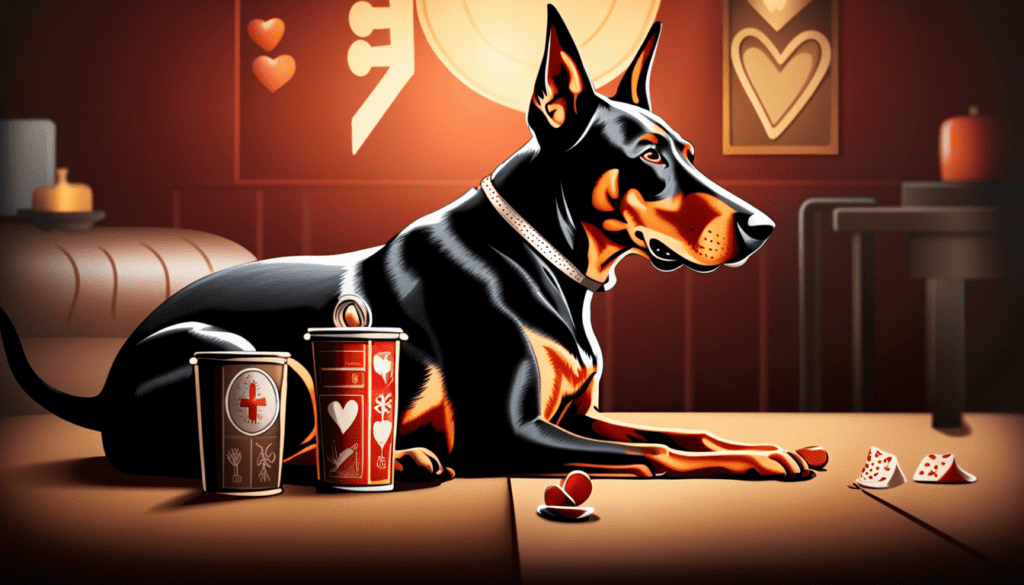
Common Health Issues in Dobermans
While Doberman Pinschers are generally robust dogs, they may be predisposed to certain genetic health conditions. Some common health issues that affect Dobermans include:
- Dilated cardiomyopathy (DCM): A heart condition characterized by the enlargement of the heart chambers, which can lead to heart failure.
- Von Willebrand’s disease: A blood clotting disorder that can cause excessive bleeding and bruising.
- Hip dysplasia: An inherited condition where the hip joint doesn’t develop properly, leading to arthritis and mobility issues.
- Hypothyroidism: A thyroid disorder that can cause weight gain, lethargy, and skin problems.
- Wobbler syndrome: A neurological condition that affects the spine, causing weakness and instability in the hind legs.
- Bloat (gastric dilatation-volvulus): A life-threatening condition where the stomach fills with gas and twists on itself, cutting off blood flow.
It’s essential to be aware of these potential health concerns and work closely with your veterinarian to monitor your Doberman’s health and address any issues promptly.
Preventive Measures and Regular Health Check-ups
To help prevent health problems in your Doberman, it’s crucial to prioritize preventive care. This includes:
- Providing a balanced diet: Feed your Doberman a high-quality diet formulated for their age, size, and activity level. Avoid overfeeding and monitor their weight to prevent obesity, which can exacerbate health issues.
- Regular exercise: Ensure your Doberman gets plenty of exercise to maintain a healthy weight and promote cardiovascular health. Regular walks, play sessions, and mental stimulation are essential for their overall well-being.
- Vaccinations and parasite control: Keep your Doberman up-to-date on vaccinations to protect against infectious diseases. Additionally, use preventive measures to control parasites such as fleas, ticks, and heartworms.
- Dental care: Practice good dental hygiene by brushing your Doberman’s teeth regularly and providing dental chews or toys to help reduce plaque and tartar buildup.
- Regular veterinary check-ups: Schedule routine wellness exams with your veterinarian to monitor your Doberman’s health and catch any potential issues early. These check-ups allow your vet to assess your dog’s overall health, perform preventive screenings, and recommend appropriate treatments or interventions.
By staying proactive about your Doberman’s health and addressing any concerns promptly, you can help ensure they lead a long, happy, and healthy life.
Tips for Maintaining Optimal Health and Well-being
In addition to preventive measures and regular veterinary care, there are several steps you can take to promote optimal health and well-being for your Doberman:
- Provide plenty of mental stimulation: Engage your Doberman in activities that challenge their mind, such as puzzle toys, obedience training, and interactive games.
- Maintain a safe environment: Create a safe and secure environment for your Doberman, free from hazards and potential dangers. Supervise them closely, especially in unfamiliar or potentially risky situations.
- Monitor their behavior: Pay attention to changes in your Doberman’s behavior, appetite, and energy level, as these can be early indicators of health problems. Seek veterinary attention if you notice any concerning signs or symptoms.
- Foster a strong bond: Build a strong and trusting relationship with your Doberman through positive reinforcement training, regular exercise, and quality time together. A strong bond can help strengthen their overall well-being and resilience.
- Stay informed: Stay informed about the latest developments in veterinary medicine and canine health care. Educate yourself about your Doberman’s specific health needs and be proactive about addressing any concerns or questions with your veterinarian.
By taking a proactive approach to your Doberman’s health and well-being, you can help them live a long, happy, and fulfilling life as a cherished member of your family.
Feeding and Nutrition
Proper nutrition plays a crucial role in the overall health and well-being of a Doberman Pinscher. Providing a balanced diet that meets their specific dietary requirements is essential for maintaining optimal health and vitality throughout their life. In this section, we’ll discuss the dietary needs of Dobermans based on their age and activity level, recommended feeding schedules, and tips for selecting high-quality dog food.
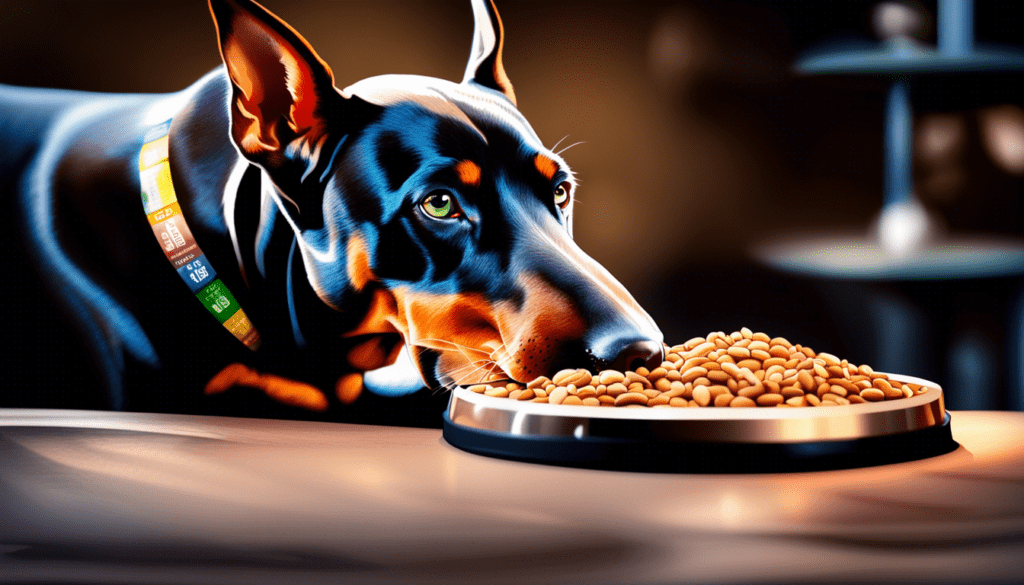
Dietary Requirements Based on Age and Activity Level
The dietary requirements of a Doberman Pinscher can vary depending on factors such as age, size, and activity level. Here’s a general guideline for meeting their nutritional needs:
- Puppies: Growing Doberman puppies require a diet that is rich in protein and nutrients to support their rapid growth and development. Choose a high-quality puppy food formulated specifically for large breed puppies to ensure they receive the necessary nutrients for healthy bone and muscle growth.
- Adults: Adult Dobermans benefit from a balanced diet that provides adequate protein, fats, carbohydrates, vitamins, and minerals to maintain their overall health and energy levels. Look for adult dog food formulas that are tailored to the nutritional needs of large and active breeds.
- Seniors: As Dobermans age, their metabolism may slow down, and they may become less active. Senior Dobermans may benefit from a diet that is lower in calories and fat to prevent weight gain and support joint health. Consider transitioning to a senior dog food formula that contains glucosamine and chondroitin to support joint mobility and reduce the risk of arthritis.
In addition to selecting the right type of dog food, it’s essential to monitor your Doberman’s weight and adjust their portion sizes accordingly to prevent obesity or undernourishment.
Recommended Feeding Schedule
Establishing a consistent feeding schedule is crucial for Dobermans to maintain regularity and prevent digestive issues. Here’s a recommended feeding schedule for adult Dobermans:
- Divide their daily food allowance into two meals, one in the morning and one in the evening, to help prevent bloating and maintain energy levels throughout the day.
- Avoid free-feeding or leaving food out all day, as this can lead to overeating and weight gain.
- Monitor your Doberman’s appetite and adjust their portion sizes as needed based on their activity level and body condition.
For puppies, feeding schedules may vary, with younger puppies requiring more frequent meals throughout the day to support their growth and development. Consult with your veterinarian for specific feeding recommendations based on your puppy’s age and size.
Tips for Selecting High-Quality Dog Food
Choosing the right dog food is essential for ensuring your Doberman receives the nutrition they need to thrive. Here are some tips for selecting high-quality dog food:
- Look for dog food formulas that list a high-quality source of protein, such as chicken, beef, or fish, as the first ingredient.
- Avoid dog foods that contain fillers, artificial preservatives, colors, or flavors, as these ingredients offer little nutritional value and may contribute to health issues.
- Consider dog food brands that have undergone rigorous testing and meet the nutritional standards set by organizations such as the Association of American Feed Control Officials (AAFCO).
- Consult with your veterinarian for personalized recommendations based on your Doberman’s specific nutritional needs, age, and health status.
By following these guidelines for feeding and nutrition, you can ensure that your Doberman receives the essential nutrients they need to thrive and live a long, healthy, and active life.
Grooming and Care
Proper grooming and care are essential for maintaining the health and well-being of your Doberman Pinscher. In this section, we’ll explore the grooming needs specific to the Doberman’s coat, dental care and hygiene, as well as establish a regular grooming routine to ensure optimal health.
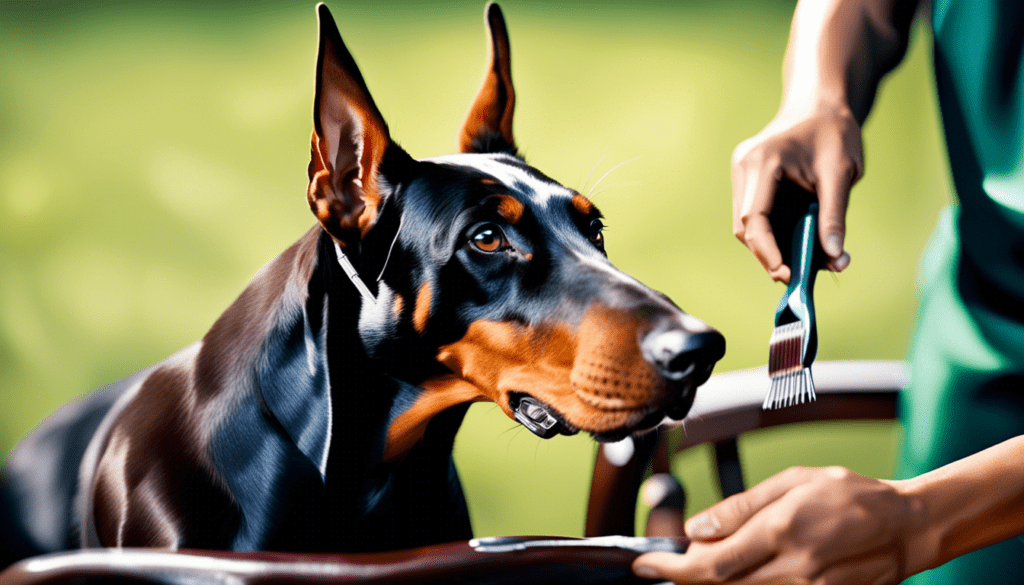
Grooming Needs for the Doberman’s Coat
The Doberman’s short coat is relatively low-maintenance, requiring minimal grooming to keep it healthy and shiny:
- Brushing: Weekly brushing with a soft-bristle brush helps remove loose hair, dirt, and debris from the coat, promoting healthy skin and reducing shedding.
- Bathing: Bathe your Doberman as needed, typically every 6-8 weeks or when they get dirty. Use a mild dog shampoo formulated for sensitive skin to avoid stripping the natural oils from their coat.
- Nail Trimming: Trim your Doberman’s nails regularly to prevent them from becoming overgrown and causing discomfort or difficulty walking. Trim the nails every 2-4 weeks or as needed, taking care to avoid cutting the quick.
- Ear Cleaning: Check your Doberman’s ears regularly for signs of wax buildup, debris, or infection. Clean the ears with a veterinarian-recommended ear cleaner and cotton ball to remove dirt and prevent ear infections.
- Dental Care: Dental hygiene is crucial for Dobermans to prevent dental problems such as tartar buildup, gum disease, and tooth decay. Brush your Doberman’s teeth regularly with a dog-specific toothbrush and toothpaste to maintain oral health.
Dental Care and Hygiene
Maintaining good dental hygiene is essential for your Doberman’s overall health and well-being:
- Brushing: Brush your Doberman’s teeth daily or at least several times a week using a dog-specific toothbrush and toothpaste. Focus on the outside surfaces of the teeth, using gentle circular motions to remove plaque and tartar.
- Dental Chews and Toys: Provide dental chews and toys designed to promote oral health by reducing plaque and tartar buildup. Chewing on these items helps massage the gums and scrape away debris from the teeth.
- Regular Veterinary Check-ups: Schedule regular dental check-ups with your veterinarian to monitor your Doberman’s oral health and address any dental issues early. Professional dental cleanings may be recommended to remove stubborn tartar and plaque buildup.
Regular Grooming Routine for Optimal Health
Establishing a regular grooming routine helps keep your Doberman looking and feeling their best:
- Weekly Brushing: Brush your Doberman’s coat weekly to remove loose hair and distribute natural oils, keeping the coat shiny and healthy.
- Monthly Bathing: Bathe your Doberman monthly or as needed to keep their coat clean and fresh. Use a mild dog shampoo and rinse thoroughly to avoid skin irritation.
- Bi-weekly Nail Trimming: Trim your Doberman’s nails every 2-4 weeks to maintain proper length and prevent overgrowth.
- Regular Ear Cleaning: Clean your Doberman’s ears every 1-2 weeks to remove dirt and prevent ear infections.
By following a consistent grooming routine and providing regular dental care, you can ensure your Doberman stays healthy, happy, and looking their best. Regular grooming not only maintains their physical appearance but also promotes their overall well-being and strengthens the bond between you and your canine companion.
Living with a Doberman Pinscher
Welcoming a Doberman Pinscher into your home comes with certain considerations to ensure a harmonious living environment for both you and your canine companion. In this section, we’ll delve deeper into what it means to live with a Doberman, including suitable living environments, their compatibility with children and other pets, as well as tips for responsible ownership and fulfilling the breed’s needs.
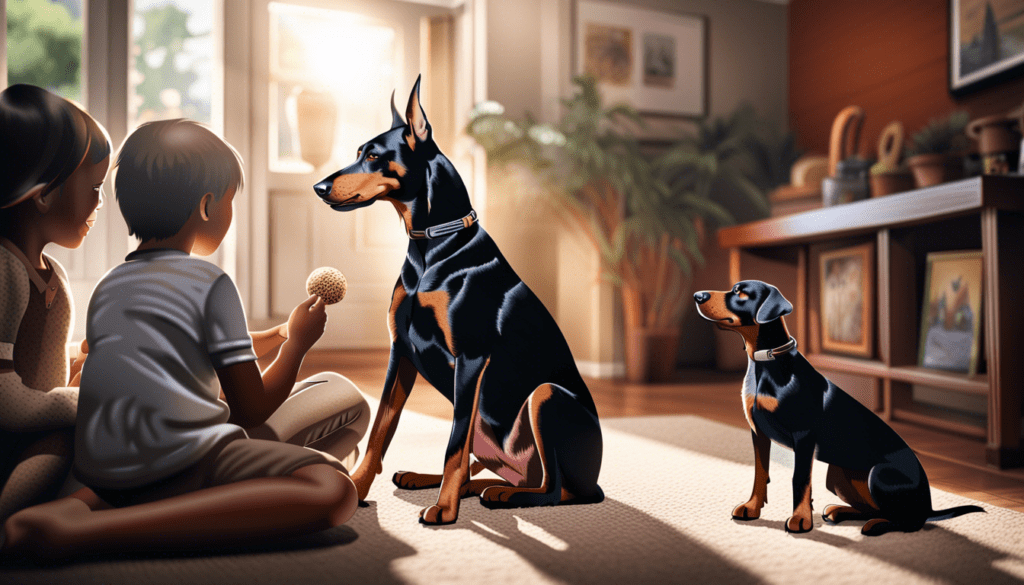
Suitable Living Environments for Dobermans
Doberman Pinschers are adaptable dogs that can thrive in various living situations, but certain factors should be considered to provide them with an optimal environment. Beyond space and activity level, it’s important to create an environment where your Doberman feels safe and secure. Providing a consistent routine, adequate mental stimulation, and access to comfortable resting areas are key components of their living environment.
Compatibility with Children and Other Pets
Doberman Pinschers are known for their loyalty and protective nature, making them excellent family pets. However, proper introductions and supervision are essential, especially when it comes to interactions with children and other pets. Teaching children how to interact respectfully with the dog and supervising playtime can help prevent accidents and foster a positive relationship. Similarly, gradual introductions and supervised interactions can help ensure harmony between your Doberman and other pets in the household.
Tips for Responsible Ownership and Fulfilling the Breed’s Needs
Owning a Doberman Pinscher is a rewarding experience, but it also requires dedication and responsibility. Here are some additional tips for responsible ownership and meeting the needs of your Doberman:
- Exercise Variation: While Dobermans require regular exercise, it’s important to vary their activities to keep them mentally stimulated. Consider incorporating activities like agility training, obedience competitions, or scent work to challenge their minds and keep them engaged.
- Positive Reinforcement: Use positive reinforcement techniques, such as treats, praise, and play, to encourage desired behaviors and build a strong bond with your Doberman. Avoid harsh training methods, as they can erode trust and lead to behavioral issues.
- Grooming Maintenance: Beyond regular brushing, pay attention to other grooming needs such as dental care, ear cleaning, and nail trimming. Establishing a grooming routine early on can help your Doberman become more comfortable with the process and ensure their overall well-being.
- Socialization Opportunities: Provide opportunities for your Doberman to socialize with a variety of people, animals, and environments. This helps them develop confidence, adaptability, and good manners in various situations.
- Health Monitoring: Stay proactive about your Doberman’s health by scheduling regular veterinary check-ups and addressing any concerns promptly. Be vigilant for signs of potential health issues, such as changes in appetite, behavior, or mobility.
By embracing the responsibilities of ownership and prioritizing your Doberman’s physical, mental, and emotional needs, you can create a fulfilling and enriching life for both you and your canine companion. With love, patience, and dedication, your Doberman Pinscher will thrive as a cherished member of your family.
Famous Dobermans in History and Pop Culture
Doberman Pinschers have left an indelible mark on history and popular culture, showcasing their intelligence, loyalty, and versatility. In this section, we’ll explore notable Dobermans in history, their representation in movies, TV shows, and literature, as well as some fun facts about famous Dobermans.
Notable Dobermans in History
Throughout history, Doberman Pinschers have been valued for their intelligence, loyalty, and courage, making them excellent working dogs in various fields. Here are some notable Dobermans in history:
- Kurt: One of the earliest Dobermans, Kurt, served as a loyal war dog during World War II. Known for their bravery and dedication, Kurt and other war dogs played vital roles in various military operations.
- Sgt. Stubby: While not a purebred Doberman, Sgt. Stubby was a mixed-breed dog known for his service in the United States Army during World War I. He participated in combat missions and became a symbol of loyalty and courage.
- Ch. Rancho Dobe’s Storm: This Doberman became the first Doberman Pinscher to win Best in Show at the Westminster Kennel Club Dog Show in 1952, showcasing the breed’s excellence in conformation competitions.
Representation in Movies, TV Shows, and Literature
Doberman Pinschers have made appearances in various forms of entertainment, often portraying roles that highlight their intelligence, loyalty, and protective instincts. Here are some notable representations of Dobermans in movies, TV shows, and literature:
- Beethoven: In the “Beethoven” film series, a mischievous yet lovable Doberman named Missy appears as one of Beethoven’s love interests, showcasing the breed’s playful and affectionate nature.
- Hooch: In the comedy film “Turner & Hooch,” a slobbery but endearing Doberman named Hooch teams up with Detective Scott Turner to solve a crime, demonstrating the breed’s loyalty and keen sense of smell.
- Books and Novels: Doberman Pinschers have also been featured in literature, often depicted as loyal companions, guard dogs, or working dogs. From mystery novels to children’s stories, Dobermans have captured the imaginations of readers worldwide.
Fun Facts about Famous Dobermans
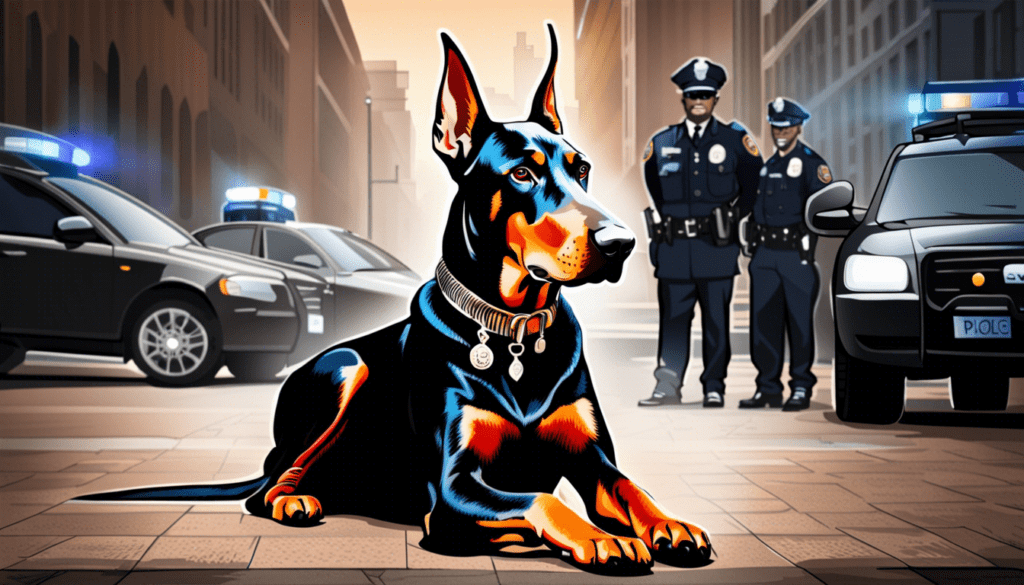
Beyond their roles in history and pop culture, famous Dobermans have left a lasting legacy with some interesting tidbits:
- Max von Stephanitz’s Favorite Breed: Max von Stephanitz, the founder of the German Shepherd Dog breed, was also a fan of Doberman Pinschers and praised their intelligence and versatility.
- Dobermans in Law Enforcement: Due to their intelligence, trainability, and protective instincts, Dobermans are commonly employed in various roles in law enforcement, including police work, search and rescue, and detection.
- Dobermans in Sports: Dobermans have excelled in various canine sports, including agility, obedience, and protection sports. Their athleticism and eagerness to please make them formidable competitors in these arenas.
From their notable roles in history to their appearances in movies and literature, Doberman Pinschers continue to capture the hearts and minds of people around the world. With their intelligence, loyalty, and versatility, these remarkable dogs have earned their place in both history books and Hollywood films, leaving an enduring legacy for generations to come.
Conclusion
As we conclude our exploration of the Doberman Pinscher breed, it’s evident that these remarkable dogs embody a unique combination of intelligence, loyalty, and versatility. Throughout history and in popular culture, Dobermans have left an indelible mark, showcasing their bravery, dedication, and unwavering loyalty to their human companions.
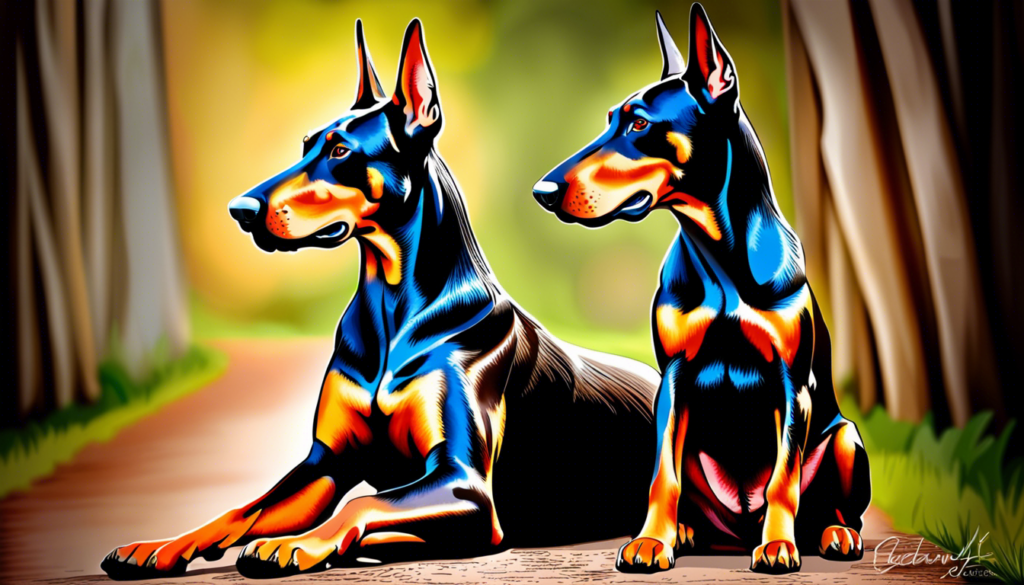
From their origins as diligent protectors bred by Karl Friedrich Louis Dobermann to their modern-day roles as cherished family pets, Dobermans have proven themselves to be adaptable and reliable companions in various roles. Whether serving as loyal war dogs, excelling in conformation competitions, or starring in beloved movies and TV shows, Dobermans continue to capture the hearts and imaginations of people around the world.
In considering the Doberman Pinscher as a companion, it’s essential to understand their needs and characteristics. They thrive in environments where they receive ample exercise, mental stimulation, and love from their owners. With proper training, socialization, and care, Dobermans can form strong bonds with their families, demonstrating unwavering loyalty and affection.
As you contemplate adding a canine companion to your life, we encourage you to consider the Doberman Pinscher breed. With their intelligence, loyalty, and protective instincts, these dogs have the potential to enrich your life in countless ways. Whether as a devoted family pet, a loyal guardian, or a beloved companion, the Doberman Pinscher offers a unique blend of companionship and devotion that is truly unmatched.
Embrace the opportunity to welcome a Doberman Pinscher into your home, and embark on a journey filled with love, loyalty, and endless adventures with one of the most remarkable breeds in the canine world.
